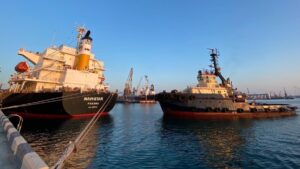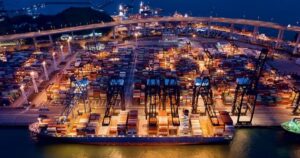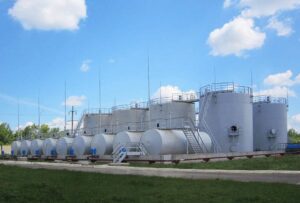
The National Bank of Ukraine (NBU) fined Pivdenny Bank (Odesa) a total of UAH 18.5 million for violations of legislation in the field of preventing and combating money laundering (AML/CFT) and currency legislation.
According to a statement on the regulator’s website, the bank must pay UAH 17.5 million in fines for improper application of a risk-based approach, improper verification of customers, shortcomings in enhanced verification of high-risk customers, and violation of the procedure for providing information in response to NBU requests.
Separately, Pivdenny Bank was fined UAH 1 million for violating currency supervision requirements, in particular for improper analysis of currency transaction documents and failure to identify currency transaction indicators.
In addition, the NBU issued two written warnings to the bank: for deficiencies in internal documents on AML/CFT and risk management, as well as for errors in statistical reporting on currency transactions.
As reported, in November 2025, the NBU applied sanctions to two banks and two non-bank financial institutions, including fines totaling UAH 20.57 million.

The National Bank of Ukraine (NBU) has imposed a penalty of UAH 33.76 million on state-owned Oschadbank, UAH 11.05 million on Pivdenny Bank and UAH 10.05 million on A-Bank, the regulator’s website reports.
According to it, Oschad was fined for improper organization of primary financial monitoring in terms of the obligation to develop, implement and update internal documents on the Law “On Prevention and Counteraction to Legalization (Laundering) of the Proceeds of Crime, Terrorist Financing and Financing of the Proliferation of Weapons of Mass Destruction” (AML/CFT) and the lack of procedures in them sufficient to ensure effective risk management.
It is noted that other reasons for the fine imposed on the financial institution include the bank’s failure to properly fulfill its obligation to implement an automation system, apply a risk-based approach, and verify new and existing customers.
Pivdenny Bank was fined for improper implementation of enhanced due diligence measures in relation to clients with high risk business relationships, untimely submission of documents at the NBU’s request to comply with the requirements of VAT/FT legislation, and failure to identify all the criteria for money laundering risk inherent in business relationships with clients.
A-Bank received a fine due to improper due diligence of the RIAs, new and existing customers, as well as improper application of a risk-based approach.
In addition, the central bank fined Diamond Pay LLC (TM DPAY, Dnipro) of Victoria Golubeva with a turnover of UAH 2.6 billion in 2023 for UAH 13.06 million for a number of violations in terms of primary financial monitoring. According to the company’s website, it is a service for organizing payment acceptance and online transfers, and its main services include payments on gambling websites, including Favbet.

The ship Sormovskiy 121 from the port of Chornomorsk and the bulk carrier Star Laura from the port of Pivdenny (both in the Odessa region) formed the fifth caravan with Ukrainian agricultural products, the Ministry of Infrastructure of Ukraine reported on Facebook on Friday.
According to his release, the total tonnage of the caravan is over 63,000 tons.
“Star Laura became the first Panamax-class ship to leave the port of Pivdenny since the beginning of the “grain initiative”, and the third in the general list of giant ships that sailed along the “grain corridor,” the ministry noted.
The Ministry of Infrastructure also indicated that “Chernomorsk” and “Pivdenny” will take two more ships for loading – Brave Commander and Petrel S, which will be loaded with more than 40 thousand tons of grain.
As reported, on July 22, 2022, in Istanbul, representatives of Ukraine, Turkey and UN Secretary-General António Guterres signed the Initiative for the safe transportation of grain and food from the Ukrainian ports of Odessa, Chornomorsk and Pivdenny.
As part of the implementation of the agreements, 12 ships with agricultural products have already left Ukrainian ports for seven countries of the world with 370,000 tons of agricultural products, while two ships entered Ukrainian ports.

Ukraine, Turkey and Russia, with the support of UN Secretary General António Guteres, agreed to facilitate safe shipping for the export of grain, related food products and fertilizers (including ammonia) from the seaports of Odessa, Chornomorsk and Pivdenny within 120 days from the possibility of extending this period.
The corresponding signing of documents within the framework of the initiative for the safe transportation of grain and food from Ukrainian ports took place in Istanbul on Friday: the Minister of Infrastructure of Ukraine Oleksandr Kubrakov, in the presence of Turkish President Recep Tayyip Erdogan, signed a tripartite document with Turkish Defense Minister Hulusi Akar and the UN Secretary General, who also signed a second such a tripartite document with Russian Defense Minister Sergei Shoigu.
As noted in the text of the initiative, a copy of which is available to the Interfax-Ukraine agency, it is based on agreements between the parties to the 1974 international convention on the safety of life at sea.
In particular, the parties agree on the following:
– maximum security guarantees for all vessels participating in this initiative;
– creation under the auspices of the UN in Istanbul of a joint coordination center (JCC), which includes representatives of all parties;
– Creation and work on the ships participating in the initiative of inspection teams from representatives of the parties, which will inspect the ships in the ports designated by Turkey, when entering / leaving the Turkish Strait to check the absence of unauthorized cargo and personnel on board.
At the same time, all activities in Ukrainian territorial waters will be under the control and responsibility of Ukraine.
The parties will not launch any attacks on merchant and civilian vessels, as well as on port facilities participating in this initiative.
If clearance of approaches to ports is required, a minesweeper from a third country must be involved
Merchant vessels must be pre-registered with the SKC and will be under technical control for the duration of their passage through the maritime humanitarian corridor agreed by all parties.
The RCC will develop and disseminate a detailed operational and communications plan, including the identification of safe havens and medical assistance options along the route.
In order to prevent provocations and incidents, the movement of vessels transiting the maritime humanitarian corridor will be remotely controlled by the Parties.
“No warships, aircraft, unmanned aerial vehicles (UAVs) can approach the maritime humanitarian corridor closer than the distance agreed by the RCC without the permission of the RCC and only after consultation with all Parties,” the text of the initiative emphasizes.
This initiative will be valid for 120 days from the date of signing by all Parties and may be automatically renewed for the same period, unless one of the Parties notifies the other of its intention to terminate the initiative or change it.
At the same time, the achievement of an agreement on the export of Ukrainian grain does not mean a weakening of the security regime in the Black Sea, representatives of Ukraine have repeatedly emphasized.
CHORNOMORSK, EXPORT, GRAIN, ODESSA, PIVDENNY, PORT, RUSSIAN FEDERATION, TURKEY, UKRAINE

The administration of Pivdenny seaport (Odesa region) has revised the discount applied to port dues for ships that enter the port to carry out cargo operations with grain cargo.
According to the website of the Ukrainian Sea Ports Authority (USPA), from January 1, 2022, for ships that call at the seaport to carry out operations for loading or unloading general and bulk grain cargo, a 30% discount will be applied to the rates of all types of port dues that are levied in favor of the USPA.
This decision was made in accordance with the order of the port administration under No. 195/27 dated October 13, 2021.
“Grain cargo refers to cereals, legumes, oilseeds used for food, seed, fodder and technical purposes, as well as products of their processing,” the report says.
A 30% discount will be applied if the following criteria are met: loading and unloading grain cargo; bulk and general (bags and big bags) grain cargo; carrying out cargo operations at the berths located in the seaport.
The USPA emphasizes that the discounts established for the rates of port dues do not apply to the administration fee.

NJSC Naftogaz Ukrainy is studying the issue of building a tank farm for storing strategic reserves of oil and petroleum products at the site of the Pivdenny maritime oil terminal (Odesa region), the company said in a press release published on August 20 with reference to acting CEO Yuri Vitrenko who spoke about it during his trip to the site on 19 August.
“The terminal where we are now is a critical element of the oil transmission system of Ukraine with a huge potential for development. We intend to develop it to boost the reliability of supplying Ukraine with oil. This is an extremely important platform for creating a strategic oil reserve,” he said.
At the same time, Vitrenko said that the strategic oil reserve is necessary both in accordance with European rules and in view of the fact that Ukraine is actually in a state of war with Russia, and still does not have a strategic oil and oil products reserve.
According to the head of Naftogaz, at the first stage it is about the construction of a reservoir for strategic reserves with a capacity of about 120,000 tonnes at the Pivdenny maritime oil terminal site. In general, the first stage of the project may include the construction of up to four tanks.
Pivdenny maritime oil terminal is connected to the Druzhba oil trunk pipeline system near the city of Brody (Lviv region) through the Odesa-Brody pipeline with a length of 674 km and an annual capacity of 9 million tonnes. It was launched in 2001.
MARITIME TERMINAL, PIVDENNY, STORING, STRATEGIC OIL, TANK FARM